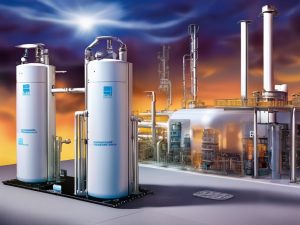A Collaborative Effort for a Clean Future
 The hydrogen economy holds immense promise for a clean and sustainable future. By collaborating across industries, governments, and academia, we can overcome the existing challenges and unlock the full potential of hydrogen. By investing in research, developing innovative technologies, and creating supportive policies, we can pave the way for a hydrogen-powered future that benefits the environment and ensures a secure energy future for generations to come.
The hydrogen economy holds immense promise for a clean and sustainable future. By collaborating across industries, governments, and academia, we can overcome the existing challenges and unlock the full potential of hydrogen. By investing in research, developing innovative technologies, and creating supportive policies, we can pave the way for a hydrogen-powered future that benefits the environment and ensures a secure energy future for generations to come.
As the world seeks cleaner alternatives to traditional fossil fuels, hydrogen has emerged as a promising energy carrier with the potential to revolutionize multiple sectors. This article explores the opportunities and challenges associated with the hydrogen economy, discussing key market dynamics, technological advancements, and potential applications.
Hydrogen Economy: Unlocking Opportunities and Overcoming Challenges in the Race for Clean Energy
The world is on a quest for clean, sustainable energy solutions to combat climate change and ensure a secure energy future. In this race, hydrogen (H₂) is emerging as a frontrunner, with the potential to revolutionize the way we power our planet. But what exactly is the hydrogen economy, and what are the hurdles we need to overcome to unlock its full potential?
The Promise of Hydrogen: A Clean Energy Carrier
Hydrogen isn’t a new discovery, but its potential as a clean energy carrier is gaining significant traction. Unlike fossil fuels, burning hydrogen produces no greenhouse gas emissions, only water vapor (H₂O). This makes it a highly attractive option for decarbonizing various sectors, including:
- Transportation: Hydrogen fuel cell electric vehicles (FCEVs) offer a clean alternative to gasoline-powered cars. They boast rapid refueling times and extended range, addressing key concerns associated with battery electric vehicles (BEVs).
- Power Generation: Hydrogen can be used in fuel cells to generate electricity, providing a flexible and clean power source, especially for areas with intermittent renewable energy sources like solar and wind.
- Industry: Several industrial processes rely on fossil fuels. Hydrogen can be a game-changer, particularly in sectors like steel production and chemical manufacturing, where achieving significant emission reductions remains a challenge.
Unlocking Opportunities: Building a Hydrogen Economy
Transitioning to a hydrogen economy requires addressing several key aspects:
- Hydrogen Production: Currently, most hydrogen is produced through steam reforming of natural gas, which still emits greenhouse gases. The focus is shifting towards “green hydrogen” produced by electrolysis using renewable electricity sources like solar or wind.
- Storage and Transportation: Hydrogen is a lightweight gas, making storage and transportation challenging. Advancements in high-pressure tanks and exploring alternative carriers like ammonia are crucial for efficient hydrogen logistics.
- Infrastructure Development: A robust network of hydrogen fueling stations is essential for widespread adoption of FCEVs. Additionally, infrastructure for industrial hydrogen use needs to be established.
Overcoming Challenges: Building a Sustainable Hydrogen Future
While the potential of hydrogen is undeniable, there are challenges to address:
- Cost Competitiveness: Currently, green hydrogen production is more expensive than traditional methods. Cost reductions through technological advancements and economies of scale are essential.
- Policy and Regulation: Supportive government policies and regulations are crucial to incentivize investment in hydrogen production, infrastructure development, and research & development.
- Public Perception: Raising awareness about the benefits of hydrogen and addressing concerns regarding safety will be vital for widespread public acceptance.


